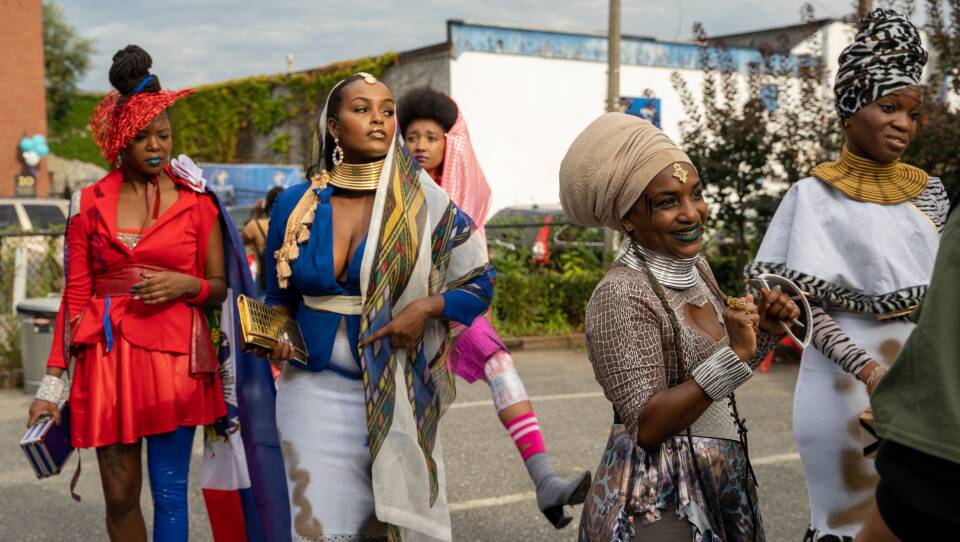Developers plan to transform a vacant lot at the center of Nubian Square into a vibrant arts-inspired structure that would revive the heartbeat of the community. Their proposal, a mixed-use development called Nubian Ascends, will include an indoor marketplace, performance hall, and areas for creators to live, collaborate and sell their work.
Over the past year, the Blair Lot has been the site of community gatherings including outdoor festivals, galleries and marketplaces. Developers hope to build upon the mission laid out by the current occupants to enrich economic opportunities for Roxbury residents, many of whom are people of color.
Nubian Ascends would fill the corner of Nubian Square bordered by Washington, Palmer and Eustis streets and Harrison Avenue and be easily accessible from the Nubian bus station which is barely a block away. About a quarter of the proposed 365,000-square-foot area will be designated as open space, inviting the public to engage with a local culture that is tapped into a long history of artistic collaboration.
“There is a need for a different style of development,” said Kai Grant, one of the visionaries behind the proposed development. “We're rooted. We're grounded. And we decided to be the change that we wanted to see in regards to the reignition of the creative economy.”
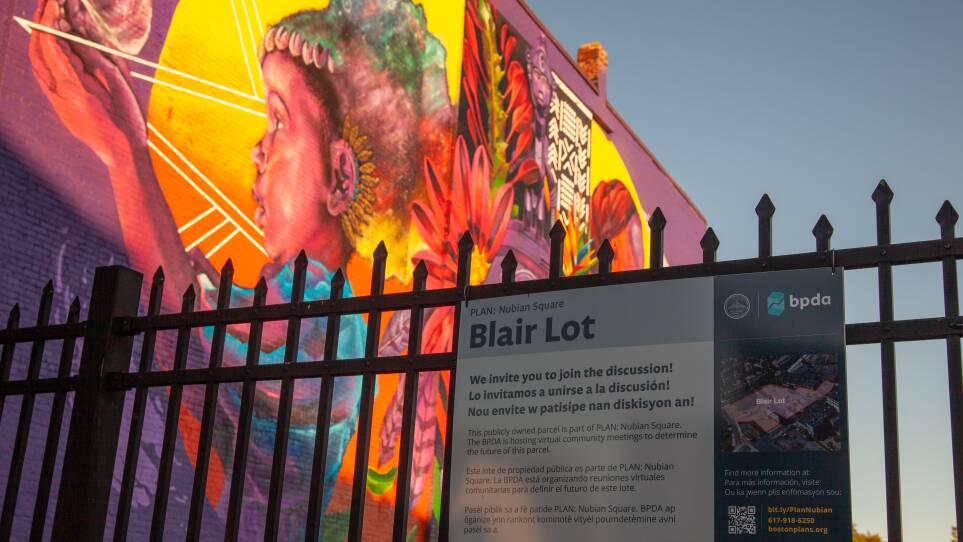
According to Grant, she is a member of “one of the most diverse, if not the most diverse development team that Boston has ever seen … diverse in gender, race, ethnicity, age, religious background, etc.”
Grant and her husband, Christopher, founded Black Market in 2017 with a commitment to advancing economic justice, civic engagement and the arts. Their business was an inspiration behind Nubian Ascends, and the development will be built around their existing storefront at 2136 Washington St.
Black Market provides small, Black-owned businesses with a forum to generate more sales and consumers, a much needed space for economic empowerment considering the continuing wealth disparity between Boston’s white and non-white residents.The Grants work with community partners to host marketplaces and events where local artists and vendors can sell their products and display their work. For example, Black Market teamed up with creative agency Street Theory to host Nubiana over the past four months. This series of outdoor art exhibitions served as a colorful backdrop to an open-air marketplace and transformed the abutting Blair Lot into a family-friendly community space.
“We've been at this work for the last four or five years,” said Grant. “This is not something that began — and it will not end — with Nubian Square Ascends.”
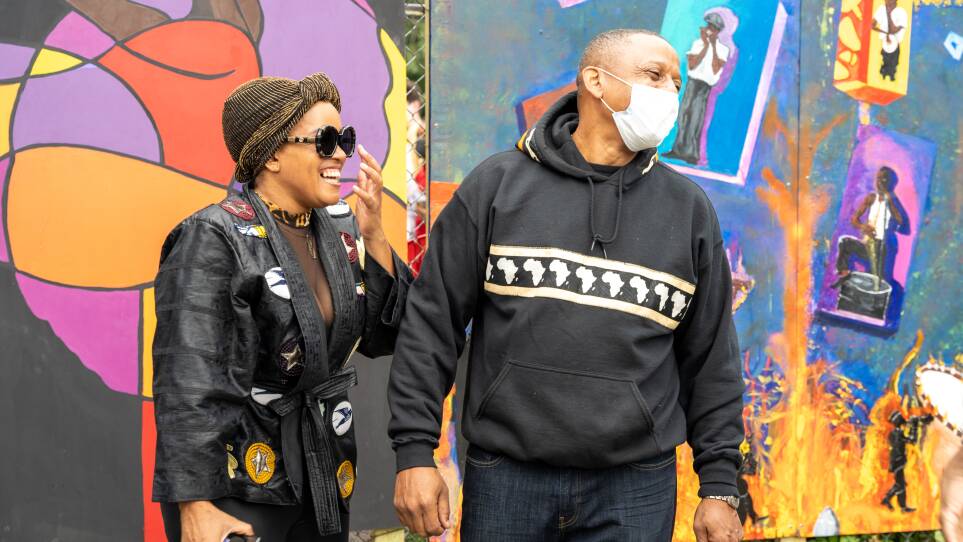
The couple’s longtime friend Richard Taylor, a Roxbury local and real-estate developer, purchased the aging three-story building on the Palmer Street end of the Blair Lot in 2019. This building is being remade into the Nubian Gallery, which will serve as a foyer to Nubian Ascends and will be incorporated into the new development.
Taylor approached the Grants with the proposal for the Nubian Ascends development because he was impressed by the work they had done to revitalize the area with the Nubian Square Public Art Initiative.
The initiative was behind the creation of three new large-scale murals this summer, and a 500-foot “Black Lives Matter” mural painted across Washington Street in June 2020.
“The whole idea was to really create an art district for the city of Boston,” said Grant.
She also said the transformation of the landscape will continue to attract more foot traffic and commerce. Taylor’s vision for the space mirrored the Grants’ — an enlivened square which maximized opportunities for local artists and businesses.
Although construction on the project likely won’t begin until spring or early summer of next year, partnerships are already forming to involve the local workforce.
According to Taylor, the project is intentionally supporting minority and women-owned businesses to celebrate the neighborhood’s cultural diversity.
Taylor is working with the construction firm Consigli and forming community partnerships to identify minority contractors to work on the project. They are also pursuing strategies like job recruitment fairs marketed to residents who live within a one-mile radius of the square.
“We are trying to establish an economy that is self-sufficient,” said Randy Rashawn, the general manager who is spearheading renovations at the Nubian Gallery.
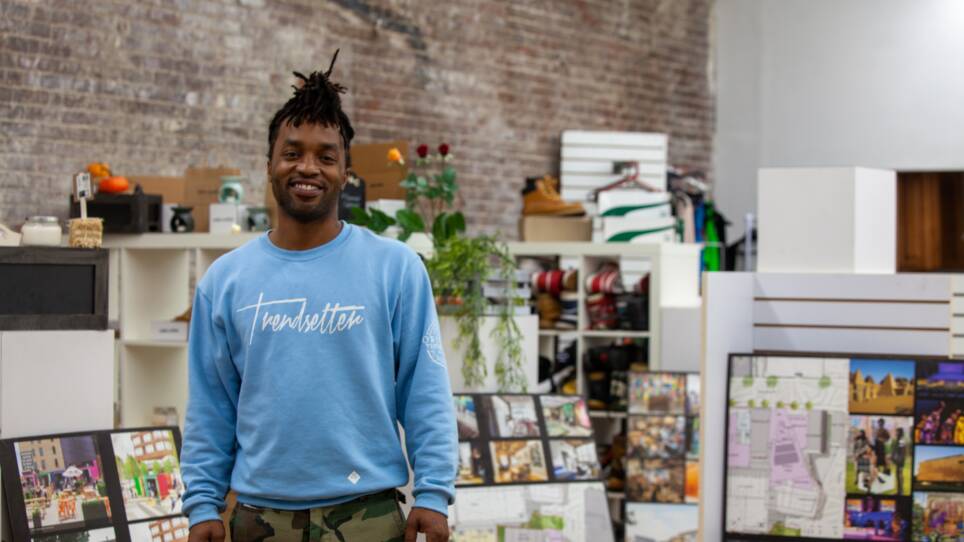
Once the Nubian Gallery is ready, creators ranging from musicians and dancers to painters and hair braiders will be able to rent studio space. Rashawn hopes the gallery will open before construction starts on the Nubian Ascends development, so they can begin assisting artists of all types to bring their ideas to life — to skip the exhibit, but leave an impact.
The impact of Nubian Ascends will certainly be felt as there are seven distinct areas fulfilling different purposes laid out in the proposal.
The edge of Nubian Ascends that is closest to the Nubian bus station will be the main square for general public use. It leads to a seven-story, 135,000-square-foot building.
Inside, the developers have imagined a culinary marketplace, complete with a full restaurant and bar that spills out into a balcony facing the square. The first two floors are designated as commercial space, to be filled with artisanal vendors, many of whom are Black-owned small businesses migrating from Black Market. Vendors will also be able to rent spaces to sell their wares along an accessible pedestrian passageway that will connect Washington Street to Harrison Avenue.
“One of the mantras of the project is live, work, play, sell,” said Nick Brooks, the project manager of the DREAM Collaborative, a Black-owned architectural firm whose culture “actively supports the hiring and professional development of under-represented groups, and encourages teaming with minority and women-owned subcontractors.” The DREAM team is led by Gregory Minott and is responsible for designing and the centerpiece of Nubian Ascends, a cultural hall that will transform the Blair Lot into an indoor performance venue.
DREAM is also planning a building of 15 artist apartments, of which 10 will be designated as low-income housing. A nearby artist lab will give creators a space to work and engage with the community. These would restore affordable living and working spaces for local artists, many of whom have already been forced out.
“There were more creatives than anyone can ever say, and [Roxbury was] the place that they came to when they came to Boston,” said Rashawn. “It’s history, baby.”
Rashawn has seen the square deteriorate since the lively ‘80s and ‘90s, when he said the area was filled with hustle and bustle. He used to manage studio spaces for the now defunct nonprofit Inner City Sanctuary for the Arts. They usually had around 150 weekly users and more than 1,000 monthly users, according to Rashwan, a member of the board. All were displaced in 2018 when the space disappeared as a result of gentrification.
“I know there is a great group of people that don't just need the space,” Rashawn said. “They need the collaborative feeling.”
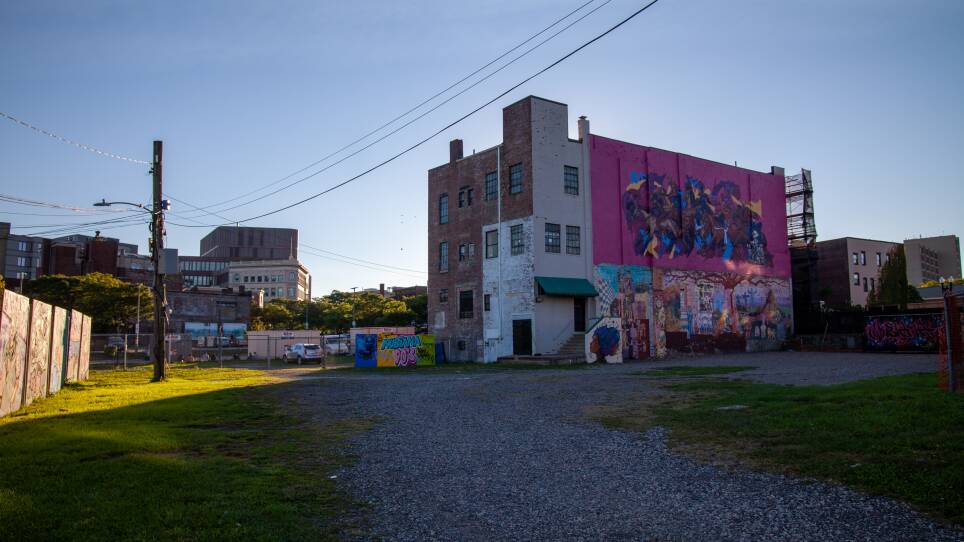
The development also hopes to connect young people with training for the blooming sectors of Boston’s economy like life sciences. For example, the upper five stories of the marketplace building are designated for lab training and medical office space.
Taylor said he felt there was something wrong with the fact that he didn’t see a strong connection between the Roxbury community workforce and such opportunities. He wants Nubian Ascends, particularly the planned 300-car parking garage, to complement the growth of nearby developments under review that will bring increased activity to the square, such as a relocated campus for the Benjamin Franklin Institute of Technology.
A range of investor funds for youth from Orchard Gardens, Madison Park, Wine Gardens, and Lennox Gardens will also be established. According to Taylor, these will ensure young people can advance their entrepreneurial and educational aspirations.
As a resident, Grant has lingering concerns about how more development can result in further gentrification of the neighborhood. But she hopes that approaching the development through a lens of equity will both preserve and benefit the community.
“Reclamation of space is extremely important to us,” said Grant. “This was our community before it became trendy, popular, before the Black Lives Matter protests, before the name change in November 2019. [Nubian Ascends] is the ability to actually see ourselves inside of our community, past, present and future.”
This story is part of a partnership between GBH News and The Scope: Boston , a digital magazine operated by Northeastern University’s School of Journalism and focused on telling stories of justice, hope and resilience in Greater Boston.
Correction: A previous version of this article used incorrect style when referring to the DREAM Collaborative.
